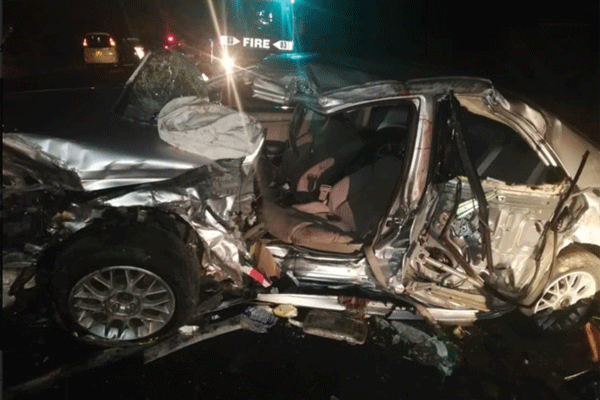
BY JAIROS SAUNYAMA
ROAD accidents continue to kill people on Zimbabwe’s highways despite heavy traffic police presence, with the majority of the accidents attributed to human error. In a bid to avoid loss of life and limb, the government has been contemplating formulating a policy that will see every driver obtaining a compulsory Defensive Driving Certificate (DDC) to tame the traffic jungle.
Transport and Infrastructural Development minister Joel Biggie Matiza recently acknowledged that the country was losing its active population through road accidents, with the nation’s Gross Domestic Product (GDP) being negatively affected as well.
“Road carnage is high in our country and because of this, all motorists are encouraged to obtain DDCs, as we move in to tame the road jungle. Those who operate public vehicles should be on the forefront. However, we want all motorists to take defensive driving courses. We will see how, as government, we can make this compulsory. For now, we are urging road users to think about DDCs,” he said.
Last year, a total of 1 986 people perished in road accidents, compared to 1 828 in 2017. It is estimated that at least five people die daily on the country’s roads, with an average of 2 000 people losing lives in accidents annually.
According to a research paper conducted by the Traffic Safety Council of Zimbabwe (TSCZ) in April 2018, more than 70% of drivers involved in fatal accidents during the 2017/2018 festive season had no DDCs.
“A total of 147 drivers involved in the 112 fatal road traffic collisions, 97,3% of the drivers were not trained in defensive driving, while 2,7% were trained. Also of the 147 drivers, 52,4% were charged of culpable homicide. About 70,1% involved in the road accident within the same period were private cars, 18,4% being public service vehicles (PSV) and 11,6% is unknown due to hit-and-run incidences,” reads the paper.
During the same period a total of 30 drivers were killed, 13 injured and 91 unhurt. Moreover, during the 2017/2018 festive season, 76 drivers involved in road accidents had no driver’s licences (51,7%).
- Chamisa under fire over US$120K donation
- Mavhunga puts DeMbare into Chibuku quarterfinals
- Pension funds bet on Cabora Bassa oilfields
- Councils defy govt fire tender directive
Keep Reading
The research indicated that most private vehicle drivers are not holders of DDCs and constitute a greater number of those involved in fatal road accidents.
Zimbabwe Abnormal Vehicle Escort Association national chairperson Emmanuel Machikwa said a driver with a DDC has a higher chance of avoiding an accident compared to one without.
“The issue of DDCs is very important because the Highway Code that we learn from mostly teaches us about road signs and regulations and how to observe them, but when it comes to DDCs it goes further to explain to motorists how to react in an accident or about to be involved in an accident. The course teaches on how a motorist can defend self even from reckless drivers or a defective vehicle. For example, if you have a tyre burst, one is taught how to handle the vehicle and so on. A driver who is a holder of a DDC drives three cars, the one in front, the one at the back and his own — this helps a lot in avoiding road carnage,” he said.
The opening of Asian markets through globalisation has resulted in the influx of second-hand cars in the country. This has increased the number of private vehicles on the country’s roads with most car owners not even holders of a valid driver’s licence.
TSCZ spokesperson Tatenda Chinoda said they have been lobbying for compulsory DDC training.
“We have been lobbying that driver training in defensive driving be compulsory for every driver. By its very definition, defensive driving is driving to prevent road traffic collisions even if other road users make mistakes or there are unfavourable road traffic conditions like rain and light. Another gain is that when traffic enforcement agents check on this requirement on drivers, cases of drivers driving without licences will be diminished. It is easy to relate a driver without a valid defensive driving certificate to an unlicensed driver since one must produce a valid licence before attending the defensive driving course,” he said.
Chinoda said holistic training was important in matters of road safety and the defensive driving course was designed to humanise driving by developing the driver’s affective and “cognitive domains”, besides the psycho-motor skills enhanced through the current driver learner curriculum.
“Also, we must not leave anything to chance when it comes to safety — matters of life or death, like the road traffic injury epidemic, training is critical and it will work,” he said.
Every day in Zimbabwe, on average, a road traffic collision occurs every 15 minutes. About 38 to 40 people are injured and five people die on our roads every day. Annually, the country loses an average of 2 000 people, while about 13 000 people are injured. This results in an estimated loss of about US$406 million, an amount which is up to 3% of GDP pegged at US$14 billion.
However, the Passenger Association of Zimbabwe president Tafadzwa Goliath played down the idea of compulsory DDCs for private motorists, saying there is need to address other key issues to combat road accidents.
“We are opposed to the issue of compulsory defensive driving courses for every driver in the country. Individuals should participate out of their own free will. However, mandatory DDC for drivers of passenger service vehicles, for instance, taxi, bus and commuter omnibus drivers is necessary, as is for haulage trucks drivers.
“There is need to address key issues that can bring about safer roads, which are enforcement, road engineering, emergency preparedness and education. Enforcement by the Vehicle Inspection Department and the Zimbabwe Republic Police is key. There are statutory instruments that are not currently being implemented. For instance, SI 129 of 2015, which states that there should be speed limit devices on all public transport vehicles to avoid road carnage through speeding, is yet to be implemented,” he said.
Goliath added that traffic law enforcers have not been tough on drivers who travel under the influence of alcohol as well as joining the technological world and introduce crucial devices on major highways like speed cameras.
“There is need to introduce breathalysers as well as night patrol and speed traps. Many Zimbabweans are now in the habit of driving under the influence of alcohol, including PSV drivers. PSV drivers should also go for regular eye and medical tests. We need to rehabilitate, improve and, where necessary, expand our road networks,” he said.











